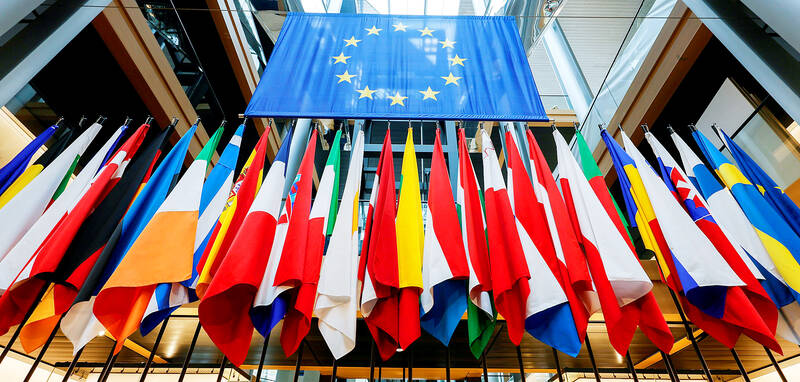EU institutions should “urgently draw up a scenario-based strategy” to tackle Taiwan’s security challenges, the European Parliament said on Wednesday as it adopted the implementation reports on two major EU security policies.
The parliament adopted the annual report on the implementation of the Common Security and Defense Policy with 459 “yes” votes, 93 “no” votes and 85 abstentions, and the implementation report on the Common Foreign and Security Policy with 407 “yes” votes, 92 “no” votes and 142 abstentions.
In its resolution on the defense policy report, the parliament said China had been using its military power to intimidate and threaten its neighbors, referring to China’s military drills around Taiwan in August last year following then-US House of Representatives speaker Nancy Pelosi’s visit to Taipei.

The flags of the EU and its member states fly at the European Parliament in Strasbourg, France, on Oct. 19, 2021.
Photo: REUTERS
The resolution said that China’s “dangerous military actions and provocations continue to occur on a daily basis.”
The parliament expressed grave concern about China’s military buildup in the South China Sea, its incursions into Taiwan’s air defense identification zone, and its disinformation campaign and cyberattacks against Taiwan.
It called on China to stop these actions, saying they threaten the stability of the Indo-Pacific region, and directly affect European prosperity and security.
In the resolution on the foreign policy report, the parliament said it “strongly condemns” China’s continued military provocations against Taiwan, reiterating its firm rejection of any unilateral change to the “status quo” in the Taiwan Strait against the will of Taiwanese.
It expressed concern about Chinese President Xi Jinping’s (習近平) announcement at the Chinese Communist Party’s 20th National Congress last year that Beijing would not renounce the use of force against Taiwan.
It said Taiwan is a key partner of the EU that shares the bloc’s values, and called for greater cooperation on trade — including signing bilateral investment agreements — as well as customs inspections, diversifying and bolstering supply chains, and combating disinformation.
It encouraged exchanges between Taiwan and the EU “at the most senior levels possible” in culture, science, language education and the media, while reiterating its support for Taiwan’s meaningful participation in international bodies and organizations.
In Taipei, the Ministry of Foreign Affairs yesterday thanked the parliament for its support, adding that it has over the past two years passed 25 Taiwan-friendly resolutions.
Wednesday’s resolutions demonstrate its strong support of Taiwan and the stability across the Taiwan Strait, Deputy Director-General of European Affairs Lu Shih-fan (呂世凡) said.
The resolutions echo the report on EU-Taiwan Political Relations and Cooperation, which the parliament passed on Oct. 21, 2021, and support efforts to deepen Taiwan-EU ties, he added.
Lu said the government would continue to promote interactions and exchanges with the EU while pursuing peace and stability across the Strait.
Additional reporting by Lu Yi-hsuan
Source: Taipei Times - 2023/01/20




















